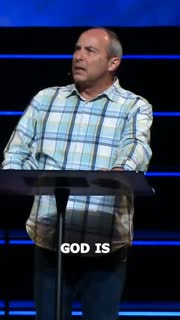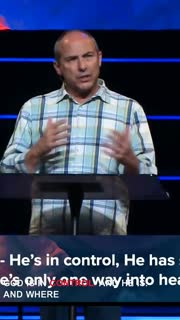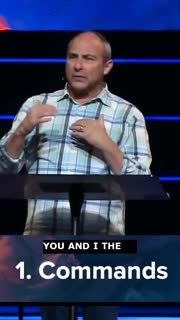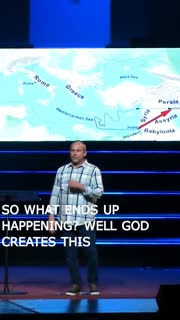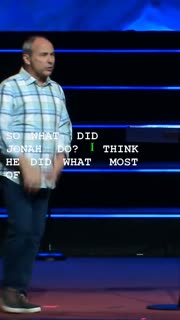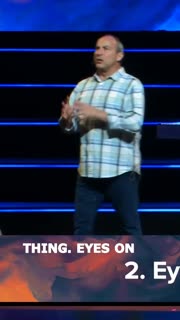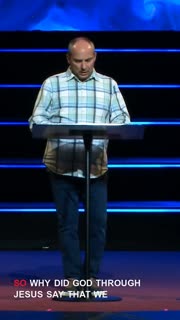Aligning with God's Will Through Prayer and Obedience
Devotional
Sermon Summary
Bible Study Guide
Sermon Clips
### Quotes for Outreach
1. "God is the God of the impossible that's his territory and he invites you and I to experience the impossible becoming possible because all things are possible with God I can do all things through Christ who gives me strength so instead of allowing eyes of fact be the strict determination for how I make my decisions I'm going to have the eyes of faith empower me to see what God sees and that is how I'm going to base my decision." [46:35] (33 seconds)
2. "God is in control. And He is. And where the word sovereignty comes from is the word sovereign. And the sovereign one, that appears 303 times throughout the Bible. And what it means is one who is over all things. I kind of like to add one word because it's God. One who is supremely over all things. God's the one who's created all things." [25:54] (22 seconds)
3. "Jesus would put it this way in John 14, 15. Hey, if you love me. Keep my commands. God wants us to obey. He places a premium on obedience. And then just six verses later, Jesus gives us a little bit more information. I think there's a reason for that. He says in verse 21, the one who has my commands and keeps them is the one who loves me." [29:40] (27 seconds)
4. "God has given you and I the privilege to operate with free will. He's not programmed us in a pre-programmed fashion to live out in a particular way. God gives us the ability to choose. And in a sense, we need to own our responsibility with the choices we make. If we sin and disobey, we experience unwanted consequences. If we obey, that's when we see ourselves going in the right direction, the right way." [28:41] (27 seconds)
### Quotes for Members
1. "So what ends up happening? Well God creates this storm. This storm is so fierce that the crew is fearful of the ship going under. So they toss the totality of the cargo overboard. And then somehow someone has the idea. Hey let's cast lots. That was a practice back then. To find out who is responsible for this calamity. And the lot fell to Jonah. And then Jonah actually to his credit comes clean. And then in verse 12 we read this. Jonah he answered them. Pick me up and throw me into the sea. So that it will calm down for you. For I know I'm to blame for this great storm that is against you." [37:02] (40 seconds)
2. "So what did Jonah do? I think he did what most of us would do. He ran. As a matter of fact if you look at this map here. Or I guess we're going to show it back here. This is a map of the Mediterranean Sea. And if you can see the bottom red arrow. At the bottom of that arrow is the city of Joppa. And so when the Bible says that Jonah went down to Joppa. We basically believe that he was east. And north of Joppa. The bottom right hand corner there. But notice if Jonah had kept going east and north. What would he have crossed? You might not be able to see it. But it's Nineveh. Right up at the top of that arrow is Nineveh." [36:27] (41 seconds)
3. "But here's the thing. Eyes on facts alone. Is like the first way of viewing information. But there's actually a second way to view information. That's more important. And it only has opened up. To people who become Christians. And I'm talking about the second one being. Eyes of faith. Eyes of faith. This is where when you and I. Ask Jesus to become Savior and Lord of our lives. One of the things that we receive. And we receive a number of things. We are actually given the person of the Holy Spirit. Who now dwells inside of us." [41:06] (34 seconds)
4. "So why did god through jesus say that we have a need to pray for god's will to be done in our life well we can mess it up we can miss it or we experience spiritual resistance well why is this so important i think with what paul writes in ephesians 2 10 this is what weighs in the balance paul writes this for we brothers and sisters in christ who have asked jesus to become savior and lord of our life we are his workmanship brothers and sisters of christ we are his masterpiece and he's given us gifts and abilities and intellects we've been created in christ jesus for good works we've been created for that god asks of our lives to respond which god beforehand has prepared for us to do." [56:31] (50 seconds)
5. "But here's the problem when we strictly use eyes on facts earlier with Jonah I said the multiplication of sins effect on others in this case the others the entire children of the nation of Israel parents listen to this verse numbers 14 verse 33 this is what's recorded God says to the people of Israel your sons your sons shall be shepherds for 40 years in the wilderness and they your children will suffer for your unfaithfulness can you imagine as a parent situationally looking at information and eyes on facts alone you miss God because you didn't pray and somehow that decision that you you went with somehow impacts your family your children grandchildren for the next 40 years." [47:53] (58 seconds)
Ask a question about this sermon
1. "God is the God of the impossible that's his territory and he invites you and I to experience the impossible becoming possible because all things are possible with God I can do all things through Christ who gives me strength so instead of allowing eyes of fact be the strict determination for how I make my decisions I'm going to have the eyes of faith empower me to see what God sees and that is how I'm going to base my decision." [46:35] (33 seconds)
2. "God is in control. And He is. And where the word sovereignty comes from is the word sovereign. And the sovereign one, that appears 303 times throughout the Bible. And what it means is one who is over all things. I kind of like to add one word because it's God. One who is supremely over all things. God's the one who's created all things." [25:54] (22 seconds)
3. "Jesus would put it this way in John 14, 15. Hey, if you love me. Keep my commands. God wants us to obey. He places a premium on obedience. And then just six verses later, Jesus gives us a little bit more information. I think there's a reason for that. He says in verse 21, the one who has my commands and keeps them is the one who loves me." [29:40] (27 seconds)
4. "God has given you and I the privilege to operate with free will. He's not programmed us in a pre-programmed fashion to live out in a particular way. God gives us the ability to choose. And in a sense, we need to own our responsibility with the choices we make. If we sin and disobey, we experience unwanted consequences. If we obey, that's when we see ourselves going in the right direction, the right way." [28:41] (27 seconds)
### Quotes for Members
1. "So what ends up happening? Well God creates this storm. This storm is so fierce that the crew is fearful of the ship going under. So they toss the totality of the cargo overboard. And then somehow someone has the idea. Hey let's cast lots. That was a practice back then. To find out who is responsible for this calamity. And the lot fell to Jonah. And then Jonah actually to his credit comes clean. And then in verse 12 we read this. Jonah he answered them. Pick me up and throw me into the sea. So that it will calm down for you. For I know I'm to blame for this great storm that is against you." [37:02] (40 seconds)
2. "So what did Jonah do? I think he did what most of us would do. He ran. As a matter of fact if you look at this map here. Or I guess we're going to show it back here. This is a map of the Mediterranean Sea. And if you can see the bottom red arrow. At the bottom of that arrow is the city of Joppa. And so when the Bible says that Jonah went down to Joppa. We basically believe that he was east. And north of Joppa. The bottom right hand corner there. But notice if Jonah had kept going east and north. What would he have crossed? You might not be able to see it. But it's Nineveh. Right up at the top of that arrow is Nineveh." [36:27] (41 seconds)
3. "But here's the thing. Eyes on facts alone. Is like the first way of viewing information. But there's actually a second way to view information. That's more important. And it only has opened up. To people who become Christians. And I'm talking about the second one being. Eyes of faith. Eyes of faith. This is where when you and I. Ask Jesus to become Savior and Lord of our lives. One of the things that we receive. And we receive a number of things. We are actually given the person of the Holy Spirit. Who now dwells inside of us." [41:06] (34 seconds)
4. "So why did god through jesus say that we have a need to pray for god's will to be done in our life well we can mess it up we can miss it or we experience spiritual resistance well why is this so important i think with what paul writes in ephesians 2 10 this is what weighs in the balance paul writes this for we brothers and sisters in christ who have asked jesus to become savior and lord of our life we are his workmanship brothers and sisters of christ we are his masterpiece and he's given us gifts and abilities and intellects we've been created in christ jesus for good works we've been created for that god asks of our lives to respond which god beforehand has prepared for us to do." [56:31] (50 seconds)
5. "But here's the problem when we strictly use eyes on facts earlier with Jonah I said the multiplication of sins effect on others in this case the others the entire children of the nation of Israel parents listen to this verse numbers 14 verse 33 this is what's recorded God says to the people of Israel your sons your sons shall be shepherds for 40 years in the wilderness and they your children will suffer for your unfaithfulness can you imagine as a parent situationally looking at information and eyes on facts alone you miss God because you didn't pray and somehow that decision that you you went with somehow impacts your family your children grandchildren for the next 40 years." [47:53] (58 seconds)
